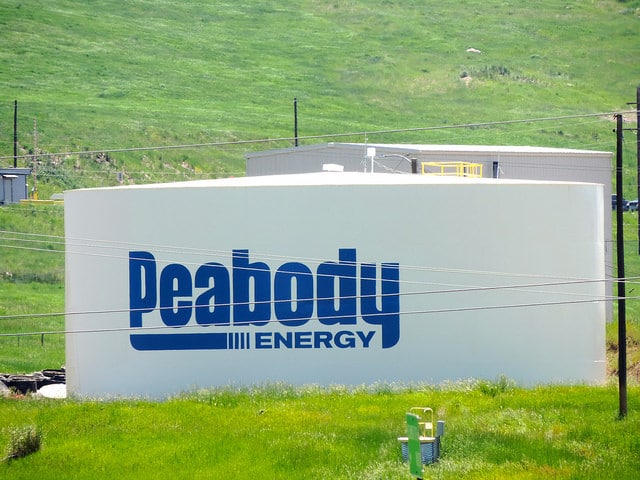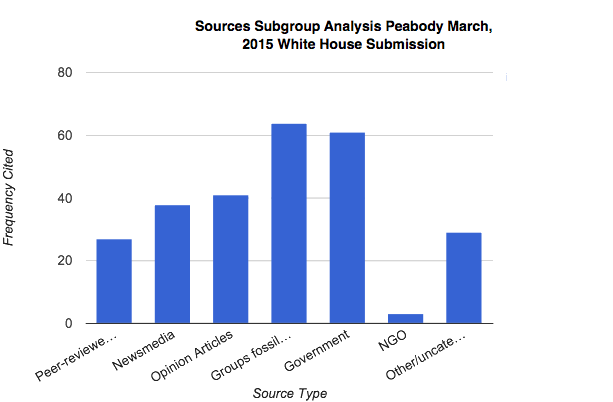In an official submission to the White House earlier this year, U.S. coal giant Peabody Energy claims that greenhouse gas is a “non-existent harm” and a “benign gas that is essential to all life.”
The March 2015 submission from Peabody further claims that “while the benefits of carbon dioxide are proven, the alleged risks of climate change are contrary to observed data, are based on admitted speculation, and lack adequate scientific basis.”
It has become increasingly rare, especially in the last few years as countries and corporations have begun to take the issue of climate change more seriously, to see a publicly traded company like Peabody Energy (NYSE: BTU) making claims that are so contrary to the well-documented scientific consensus that greenhouse gas emissions from the burning of fossil fuels are negatively impacting our climate, health and way of living.
While there are thousands of peer-reviewed scientific documents available on the impacts of climate change and greenhouse gas emissions, the Peabody climate change document relies heavily on claims made in newspaper opinion articles and by organizations with known connections to the fossil fuel industry.
An analysis of the 304 footnote citations in the Peabody document finds that opinion articles published in media outlets, primarily the Wall Street Journal, were cited as supporting evidence 41 times ,and groups with historical ties to the fossil fuel industry (e.g. Cato Institute, American Coalition for Clean Coal Electricity and the Global Warming Policy Foundation) were cited 64 times.
Articles cited from peer-reviewed scientific journals made up only 8% of the evidence cited in Peabody’s arguments:
Here are some of the key quotes from the Peabody climate change document:
“There are no demonstrated foreseeable effects of any GHG emissions.” (pg.3)
“Increases in CO2 emissions worldwide have led to prosperity, not to the predicted global temperature increases or adverse effects.” (pg.4)
“The relationship between GHG emissions and any climate change has not been proven…” (pg.10)
“There are so many uncertainties and flaws in the data and models on which global warming predictions depend that they are not fit for reasoned decisionmaking.” (pg.24)
The 71-page document was signed by Peabody Energy senior executives and its outside legal council from the firms Shook, Hardy & Bacon and Massey & Gail.
It was submitted to the White House’s Council on Environmental Quality (CEQ) on March 24, 2015. The document is an official submission by Peabody addressing the company’s concerns regarding new policies the government has proposed that would treat greenhouse gas emissions and considerations regarding climate change as part of environmental impact reviews under the US government’s National Environmental Policy Act (NEPA).
In a nutshell, NEPA requires that all projects involving a US federal government agency must include an environmental assessment. Right now, the White House is considering whether to add climate change and greenhouse gas impacts as a part of the environmental assessment criteria.
This revision to the NEPA criteria could create major challenges for companies heavily invested in fossil fuels. Peabody Energy is a pure-play coal mining company, in that they are not diversified in other energy sectors. As Peabody’s senior vice president of government relations, Fred Palmer made clear in a 2011 interview with The Guardian:
“We’re 100% coal. More coal. Everywhere. All the time.”
The White House CEQ first sought comment on the proposal to include climate change and greenhouse gas effects in NEPA in 2010.
Peabody Energy submitted comments during that period as well through the law firm Manatt, Phelps & Phillips, LLP.
In that 2010 submission to the White House’s CEQ, Peabody struck a much different tone, not arguing about whether climate change and greenhouse gas are a risk, but instead pointing out how the coal company was aiming to reduce its greenhouse gas emissions through advances in technology:
“Peabody supports continual emissions reductions, including those from C02, toward the ultimate goal of near-zero emissions from coal. Peabody is committed to, and invests in, projects to advance technologies and is a global leader in developing clean coal solutions. Peabody takes its environmental stewardship seriously…”
Last week, it was revealed that another fossil fuel giant, ExxonMobil (NYSE: XOM), was aware of the potential negative consequences of climate change as early as 1981, but then funded climate denial and anti-science groups for the ensuing three decades. This raises all sorts of issues according to the former lawyer who led a watershed tobacco corruption case on behalf of the US Department of Justice.
In that case, the Justice Department filed a racketeering suit against the major US tobacco companies alleging they had purposefully and fraudulently misled the public about the health risks of smoking tobacco.
Commenting on the Exxon news, the lead DOJ lawyer in that case against the tobacco industry, Sharon Eubanks, said the revelations could significantly worsen the fossil fuel industry’s liability picture:
“It starts to look like a much longer conspiracy. It’s like what we discovered with tobacco – the more you push back the date of knowledge of the harm, the more you delay any remediation, the more people are affected. So your liability can grow exponentially as the timeline gets longer.”
At some point, the question of who knew what and when will follow on climate change, just like it did for Big Tobacco and the link between their product and lung cancer.
You can click here to download the 2010 Peabody submission to the White House.
A full copy of the March 2015 PDF document is available for download here: Peabody Energy submission on greenhouse gas and climate change to the White House.
Peabody did not respond to multiple requests for comment.
Image credit: WildEarth Guardians on Flickr
Subscribe to our newsletter
Stay up to date with DeSmog news and alerts








